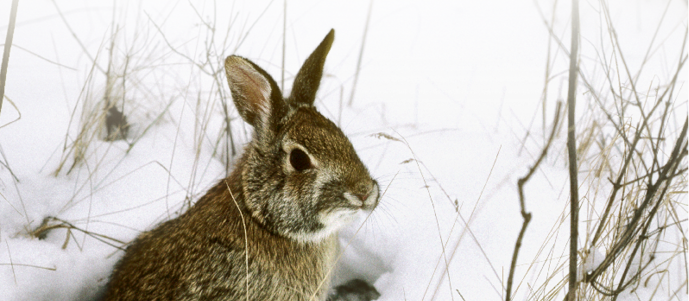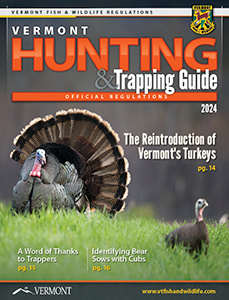Safely Field Dressing Game

Photo by John Hall
Wildlife diseases are increasingly common in Vermont. Some of these diseases can spread to humans, but risk of infection is preventable by following a few simple steps. Hunters and trappers should protect themselves from exposure to diseases when processing game by following these steps:
- Do not shoot, handle, or consume an animal acting abnormal or appearing sick.
- When field-dressing game, wear disposable gloves, use a clean knife, and minimize use of a bone saw to cut through the brain or spinal cord (backbone).
- If you do not have gloves, wash thoroughly with soap and water after field dressing.
- Minimize contact with brain or spinal cord tissues, eyes, spleen, or lymph nodes.
- Avoid consuming brain, spinal cord, eyes, spleen, tonsils, pancreas, and lymph nodes. Normal field dressing, coupled with boning out a carcass, will remove most disease containing tissue. Cutting away fatty tissue will remove remaining lymph nodes.
- Refrain from eating, drinking, and smoking while handling and field dressing game.
- Wash and disinfect knives, saws and cutting table surfaces by soaking in a solution of 50% unscented household bleach and 50% water for an hour. Thoroughly rinse all utensils in water to remove bleach. Allow them to air dry.
- Wear disposable gloves when processing and packaging the meat.
For More Information
For information on wildlife diseases such as HPAI and RHDV2, visit our website (vtfishandwildlife.com) or the US Department of Agriculture Animal and Plant Health Inspection Service webpage (www.aphis.usda.gov)
Keep an Eye out for
Please Report Potential Cases Of HPAI and RHDV2:
1. Highly Pathogenic Avian Influenza (HPAI)
- Why should I be concerned? HPAI can affect domestic poultry and a variety of wild bird species, causing mortality in large numbers within a population.
- Is it in Vermont? It has been confirmed in every county of Vermont and in several bird species. In other states it has been confirmed in some mammals.
- How can I help? Report sightings of five or more dead birds in one location. Dispose of harvested bird remains by burying or placing in the trash.
2. Rabbit Hemorrhagic Disease (RHDV2)
- Why should I be concerned? RHDV2 can affect domestic and wild rabbits and snowshoe hares. It can cause die offs in wild rabbit populations.
- Is it in Vermont? It has not been found in Vermont yet. The virus was reported in domestic rabbits in Albany, NY in 2021 and CT in 2022.
- How can I Help? Report dead rabbits that appear unharmed and are bleeding from the nose or mouth. Do not translocate live rabbits, and when field dressing dispose of remains by burying or placing in the trash.

